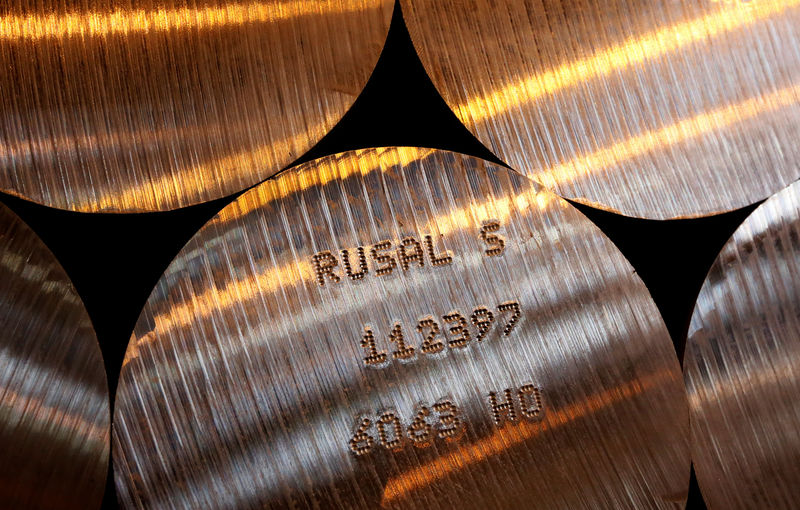By Sandrine Bradley
LONDON (LPC) - Lenders to Rusal are exploring how to get rid of their exposure to Russian aluminum company before a May deadline set by the US, as the fallout from fresh sanctions pulls Russian loan pricing lower in Europe’s secondary market.
In addition to a ban on lending to sanctioned entities, the US Treasury has given banks until May 7 to divest or transfer debt, equity, or other holdings in Rusal, energy firm EN+, and vehicle maker GAZ.
The sanctions are more severe than those imposed in 2014 after Russia’s annexation of the Crimea, as the first forced disposal of now illiquid Russian debt will bring losses for lenders.
"How much worse can it be? If you're a forced seller you've lost already and will take a big hit. If people know that your risk is looking for a new home, that has a significant and severe price tag," a loan syndicate head said.
Banks' main exposure is to Rusal, as EN+ and GAZ do not have any international syndicated loans. Rusal raised a US$1.7bn five-year pre-export finance term loan which was signed last May and pays 300bp over three-month Libor.
Rusal warned that new sanctions could result in technical defaults in a stock exchange filing on April 9. It is one of the world's biggest aluminum producers and the price of aluminum and alumina has soared after its inclusion.
The company's loan was last quoted at 98% of face value on April 11, according to Thomson Reuters LPC data, and has not been quoted since.
"All lenders to Rusal have been calling external cousel for advice - no-one is actually trying to sell the paper yet," a banker said.
Banks including lead arrangers Bank of China, Commerzbank (DE:CBKG), Credit Agricole (PA:CAGR) Corporate & Investment Bank, ING Bank, Natixis, Nordea Bank, Societe Generale (PA:SOGN), UniCredit and VTB Bank have transferred Rusal's loan into their bad loans or restructuring units, bankers said.
Banks face write downs or writing off Rusal debt if buyers cannot be found. Lenders are also exploring options including freezing Rusal's loans and putting them in an escrow account if they are unable to sell.
Even if buyers are found, funds from a sale could still be placed into escrow as it is unlikely that institutions will be willing or able to settle US dollar trades linked to Rusal, bankers said.
“If we sell in US dollars no one will clear the settlement. One way around might be to settle in a different currency if possible,” a second banker said.
Chinese banks have been named as possible buyers of Russian loans, but most Chinese banks will be unwilling to jeopardize their US operations, which could leave them unable to buy the debt.
The Russian government and the country's state-owned banks are the most obvious buyers of Rusal paper, but most of these banks, including VTB and Sberbank, are also sanctioned.
Unsanctioned Promsvayzbank could take on Rusal's debt with a guarantee from the Russian government, bankers said. A temporary nationalization of Rusal is another option, a Kremlin spokesman said on Thursday.
PULLED LOWER
The secondary pricing of some of Russia's top unsanctioned companies has also been pulled lower to around 98% of face value in Europe's secondary loan market since sanctions were announced on April 6.
The loans are effectively illiquid, however, as banks monitor their exposure and whether or not they will be forced to divest more Russian assets.
A US$2bn tranche of metal and mining company Norilsk Nickel’s US$2.5bn, five-year term loan was 1.25% lower at 98% on April 18, the data shows.
Norilsk, which is also known as Nornickel, is the world's second biggest nickel producer and is part-owned by Rusal and sanctioned oligarch Oleg Deripaska. Deripaska is the owner of EN+, which is the co-owner of Rusal and Norilsk Nickel.
The price of nickel surged to its highest level since late 2014 on Thursday, on fears that US sanctions on Rusal could be broadened and hit the company.
Several loans for the potash group Uralkali have fallen including a US$850m 2017 revolving credit facility which was 1% lower at 98%.
Uralkali’s US$1.2bn term loan maturing in April 2021 has fallen 0.5% to 99% and a US$530m term loan which matures in April 2019 has fallen 0.12% to 99.625%.
Fertilizer producer Eurochem’s US$800m, five-year term loan was 0.5% lower at 98.5%. Oil producer Gazpromneft’s US$2.15bn five year loan which matures in November is 0.5% lower at 99%.
Metals miner Polymetal’s US$350m four year pre-export finance facility maturing in September 2019 has fallen 0.7% to 99% of face value and a US$125m loan due in August 2023 for shipping company Sovcomflot has fallen 1% to 96% of face value.
